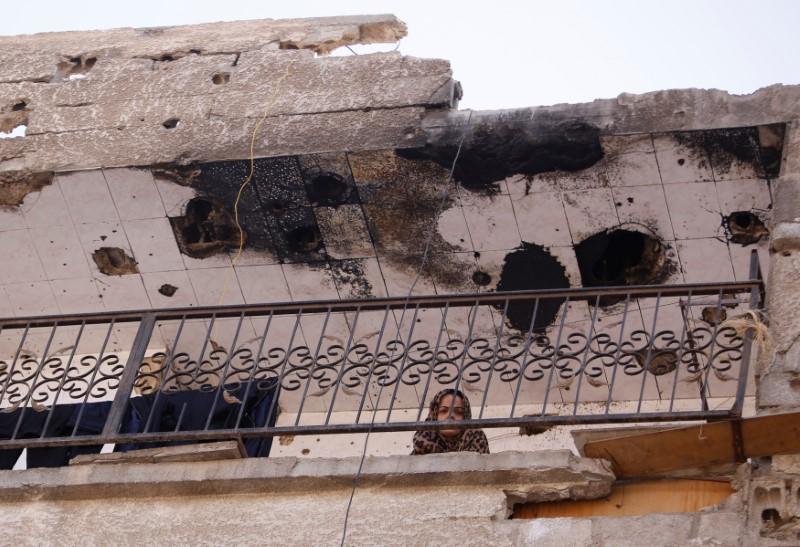London – After fighting against Syrian regime leader Bashar al-Assad for six years, rebel soldier Abu Mohammed laid down his arms as part of a peace deal in his home town of Moadamiya last year, said a Reuters report on Thursday.
But he has now fled Syria into Turkey. His reason: the Syrian regime told him to report for duty and he feared being sent to his death fighting his former allies or ISIS terrorist group.
“We’re tired of war and bloodshed, we’ve had as much as we can take,” Abu Mohammed told Reuters in a phone interview from Turkey.
The 27-year-old, who declined to give his full name, said he had signed onto the peace deal in Moadamiya, a Damascus suburb that was a rebel stronghold until last year.
He said he had been told the Moadamiya agreement would exempt him from frontline duty. “We stayed in the town on that basis.”
But this spring, he heard that men from Moadamiya had been conscripted not to serve locally but to fight for the regime against the opposition fighters.
Reuters could not independently verify the account of other soldiers from Moadamiya being taken to fight on front lines, but it echoed that of a second former rebel from Moadamiya.
Declining to be named, he said defectors were being sent to the front lines in breach of agreements communicated to them verbally by what is officially termed a “reconciliation committee”, consisting of officials and local representatives of a defeated area.
The regime minister responsible for local agreements, Ali Haidar, denied the state had broken any commitments in Moadamiya, saying accusations it had were being promoted by foreign states and rebels “annoyed” by the agreements.
He said many former rebels had joined regime forces, and hundreds had been “martyred in the front lines against terrorism”.
The rapid succession of agreements in former rebel strongholds near Damascus such as Daraya, Qudsaya and al-Tal underline how far the scales have tipped in Assad’s favor in the war that spiraled out of protests against his rule in 2011.
Fear of conscription has been a major sticking point in the local agreements, a diplomatic source said, helping to encourage residents to leave for rebel-held areas of northern Syria in what Assad’s opponents call a policy of forced displacement.
The regime has given safe passage to thousands of rebels and civilians out of regime-held territory under the deals.
The psychological scars of Syria’s seven-year old conflict run particularly deep in Moadamiya. The area was one of several near Damascus targeted by chemical weapons in 2013. The West blamed the regime for the attack which used sarin gas. Damascus denied any role.
The local agreement for the area resulted in hundreds of rebel fighters and their families being evacuated to Idlib. Others, like Abu Mohammed, decided to remain behind and turn in their weapons.
As part of the agreement, the Syrian state flag was raised again over regime buildings in Moadamiya. Restrictions on movement in and out of the area – which is still surrounded by regime forces – were eased.
There is no longer any armed presence inside the town, even from the regime side, according to several residents and former opposition activists contacted by Reuters.
Yet the second former rebel contacted by Reuters by phone said he and around 100 others there had gone into hiding, fearing enlistment to a front line where he might be killed.
“The defectors are now stuck in Moadamiya, they won’t leave,” said the former rebel, who defected to the rebellion in 2012 during his military service and who refused to give his name for fear of discovery.
He said he was recently summoned to a meeting where defectors were threatened with arrest if they did not show up for duty. “Some of them joined up, others didn’t,” he said.
“I thought of leaving, but my financial situation is very bad,” he said, adding that he would need to pay people smugglers $2,600 to get out Syria.
“I can’t think of anything now. I have nothing to think about, I have no dreams or a future.”
Abu Mohammed said he was smuggled out to Turkey with the help of friends in rebel-held Idlib in northern Syria. He said he had sold his house in Moadamiya to finance his passage.
A 50-year-old man whose two eldest sons face conscription said in a separate telephone interview that they needed “psychological preparation” if they were to return to the regime forces.
“For a young man who not that long ago was fighting the regime, after six years of war – if you now make him join the side he was fighting against, this is a problem,” said the man, who gave his name as Mahmoud.
